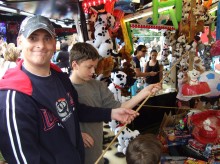 When you ask people what difficulties a person faces when trying to overcome heroin addiction, most will focus on the early withdrawal symptoms, which comprise both physical and psychological elements.
When you ask people what difficulties a person faces when trying to overcome heroin addiction, most will focus on the early withdrawal symptoms, which comprise both physical and psychological elements.
There are potentially far greater challenges that lie ahead in a journey to recovery from heroin addiction. It is important that people know this (users, family members, practitioners, etc), although it is also important that people with a heroin problem are not put off by these challenges. Many people have overcome heroin addiction.
One of my favourite pieces of addiction research focuses on the recovery journey from heroin addiction and I have described this research in the article section of this website. In the 1980s, Patrick Biernacki interviewed over 100 people in the USA who had overcome their heroin addiction without treatment. These were some of the major challenges these people faced:
1. When interviewees resolved to stop using heroin, they were uncertain about what they should do with their lives instead. They knew what they did not want to do, but they were less certain about what they did want and how they could go about getting there. This point was particularly pertinent to those people who had immersed themselves in the heroin-using lifestyle, or ‘world of addiction’, since they had lost most of the conventional social relationships in their lives.
Biernacki emphasised the lack of role models, other people in the community who had given up heroin. There was no one to ask, “How do I do this?” There was no readily accessible information about what to expect and how to deal with the various obstacles and problems that occur on a day-to-day basis.
2. After deciding to stop using heroin, interviewees were doubtful that they could abstain permanently as they remembered their past failures at trying to stop. This situation was made worse by their low self-esteem and feelings of anxiety (which they had previously dealt with by using heroin). They also had to face the early withdrawal in a weakened physical and psychological condition.
3. When considering what would replace their addict lifestyle, the interviewees often had serious doubts as to whether they could establish and maintain relationships with ‘ordinary’ people. They had little in common with non-users and also had to face the stigma that is associated with heroin addiction. Many were also worried about their criminal record, their lack of education and skills, and whether they were employable.
These problems were worse for those people who had been caught up in the heroin-using lifestyle and had cut themselves off from family, friends and mainstream social life.
4. When interviewees did stop using heroin and cut themselves off from the heroin-using world, they faced a basic problem of filling their lives with activities to fill the time they had previously devoted to their drug use and related activities.
This was much more difficult for a person who had lived almost exclusively in the world (culture) of addiction and may have been taking the drug from an early age. Some people had previously spent their entire day shoplifting, selling the goods, buying the drug and using.
5. Interviewees had to shape a new identity and social involvement in worlds that are not associated with drug use. An essential element underlying recovery is people being accepted as ‘normal’ by so-called normal society.
Former users of heroin may be reluctant to engage with ordinary people because they feel socially incompetent and stigmatised, and they may feel shame and guilt for past actions. Society has a very low opinion of drug addicts, which creates a formidable barrier for those wishing to move on from their heroin addiction.
For some participants in Biernacki’s research, the transformation from being a problem heroin user to being a non-user happened abruptly and was quite simple. However, for many others, the process was prolonged and very complex.
This research emphasises the importance of the following:
- role models, people in recovery from heroin addiction;
- readily-accessible information about the process of recovery from heroin addiction;
- connecting recovering people to other people they can identify with and trust and who can help them with their recovery and connecting to normal society
- teaching recovering people social skills to enable connections to normal society
- creating a culture of recovery, which is every bit as powerful as the culture of addiction.
Sadly, I have met very few people in the UK and Australia who have heard about this research (including treatment practitioners), other than those who have read my article on my Wired In To Recovery or Recovery Stories websites. I was shocked when working in the UK with my Wired In initiative that so few people knew about this research and other high-quality research focused on the issue.
Here was a treatment field that claimed that people needed treatment to overcome heroin addiction, that routinely called addiction ‘a chronic relapsing condition’, and where I met practitioners who would say, ‘Once a junkie, always a junkie.’ How were people going to overcome their problem in such a negative environment. NB, Of course, I’m not referring to all treatment services.
I’m told the situation is no different today, other than in communities with a strong recovery-oriented approach, where people with a heroin problem can gain hope, understanding, and a sense of belonging. Where the people who are supposed to be helping people with a heroin problem are actually aware of the factors that facilitate recovery.





